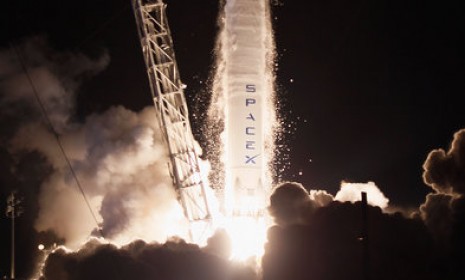What the SpaceX launch means for private space flight
The company founded by PayPal billionaire Elon Musk makes its inaugural run to the International Space Station, marking a big step for commercial space flight

A free daily email with the biggest news stories of the day – and the best features from TheWeek.com
You are now subscribed
Your newsletter sign-up was successful
Space Exploration Technologies, or SpaceX for short, launched a rocket with a capsule carrying supplies for the International Space Station on Sunday, officially beginning a new era in which NASA will count on private companies to carry cargo and, eventually, people into orbit. The unmanned Falcon 9 rocket blasted off from Cape Canaveral, Fla., and SpaceX founder and CEO Elon Musk, the billionaire PayPal founder, declared the liftoff a success. Despite a problem with one of the rocket's nine engines, SpaceX's Dragon capsule is expected to dock with the space station on schedule Wednesday. SpaceX completed a test mission in May, but this is its first paid supply run to the space station. What will this trip mean for the future of space flight? Here, a brief guide:
What is SpaceX delivering to the space station?
It's taking 1,000 pounds of supplies, including food, clothing, gear, and science experiments. The scientific projects include 23 built by students, including one designed by California middle school students to see how Silly Putty works in zero-gravity. The equipment includes a freezer to store laboratory samples at temperatures as low as 300 degrees below zero. The ship is also carrying a treat for the three people on board the space station — chocolate-vanilla swirl ice cream.
The Week
Escape your echo chamber. Get the facts behind the news, plus analysis from multiple perspectives.

Sign up for The Week's Free Newsletters
From our morning news briefing to a weekly Good News Newsletter, get the best of The Week delivered directly to your inbox.
From our morning news briefing to a weekly Good News Newsletter, get the best of The Week delivered directly to your inbox.
Why is the mission so important?
Russian, European, and Japanese cargo ships that have been ferrying supplies to the International Space Station can't bring anything back — the crafts burn up on re-entry into the atmosphere. Dragon can bring supplies and scientific materials back to Earth — a capability NASA lost when it retired the three-vehicle space shuttle fleet after Atlantis made its last flight in July 2011. "Just over a year after the retirement of the space shuttle," NASA Administrator Charles Bolden Jr. says, "we have returned space station cargo resupply missions to U.S. soil."
How long will Dragon be in space?
The capsule will remain hitched to the space station for about three weeks. First it will be off-loaded; then it will be filled back up with twice as much cargo as it carried aloft. It will be sent back with research gear, equipment, and frozen biomedical specimens, including astronauts' blood and urine samples that have been stockpiled in freezers ever since the last space shuttle mission. If all goes as planned, Dragon will leave the space station on Oct. 28, re-enter the atmosphere, and descend by parachute into the Pacific Ocean about 250 miles off the Southern California coast.
A free daily email with the biggest news stories of the day – and the best features from TheWeek.com
What's next for SpaceX and NASA?
SpaceX has a $1.6 billion contract with NASA to perform a dozen such supply runs. Musk wants to knock off two missions this year, and ramp up to as many as six next year. In three or four years, SpaceX hopes to be able to transport people in its capsules, giving NASA a way to get astronauts to the orbiting science lab without relying on Russian Soyuz rockets. Eventually, Musk wants to let astronauts pilot his Dragon capsules home using thrusters for a soft landing, like a moon landing. The company's success will help determine whether the White House can achieve its goal of turning over servicing the space station entirely to commercial companies, so the U.S. space agency can focus on developing spacecraft that can go deeper into space. "Everything hinges on the success of folks like Elon and his team," Bolden said.
Sources: The Associated Press, Aviation Week, The New York Times, Popular Mechanics